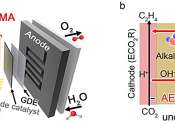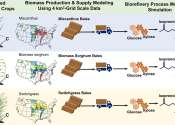Cycling, also called bicycling or biking, is the use of bicycles for transport, recreation, or for sport. Persons engaged in cycling are cyclists or bicyclists. Apart from ordinary two-wheeled bicycles, cycling also includes riding unicycles, tricycles, quadracycles, and other similar human-powered vehicles (HPVs).
Bicycles were introduced in the 19th century and now number about one billion worldwide. They are the principal means of transportation in many regions.
Cycling is a very efficient and effective mode of transportation optimal for short to moderate distances. Bicycles provide numerous benefits compared to motor vehicles, including exercise, an alternative to the use of fossil fuels, no air or noise pollution, much reduced traffic congestion, easier parking, greater maneuverability, and access to both roads and paths. The advantages are at less financial cost to the user as well as society (negligible damage to roads, and less pavement required). Criticisms and disadvantages of cycling include reduced protection in crashes, particularly with motor vehicles, longer travel time (except in densely populated areas), vulnerability to weather conditions, difficulty in transporting passengers, and the skill and fitness required.









